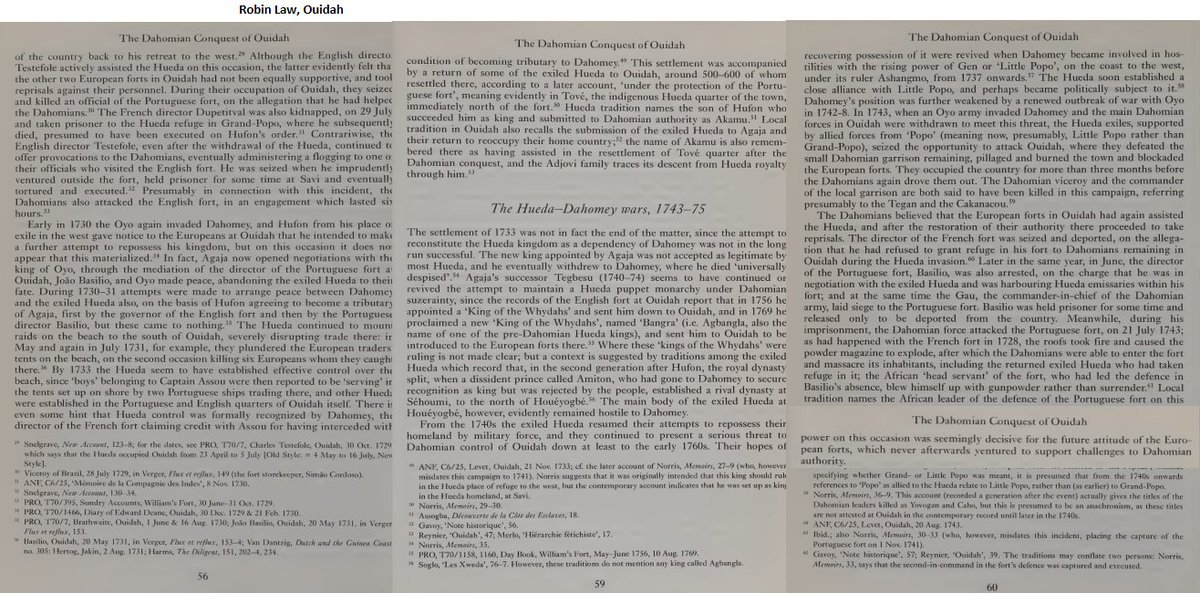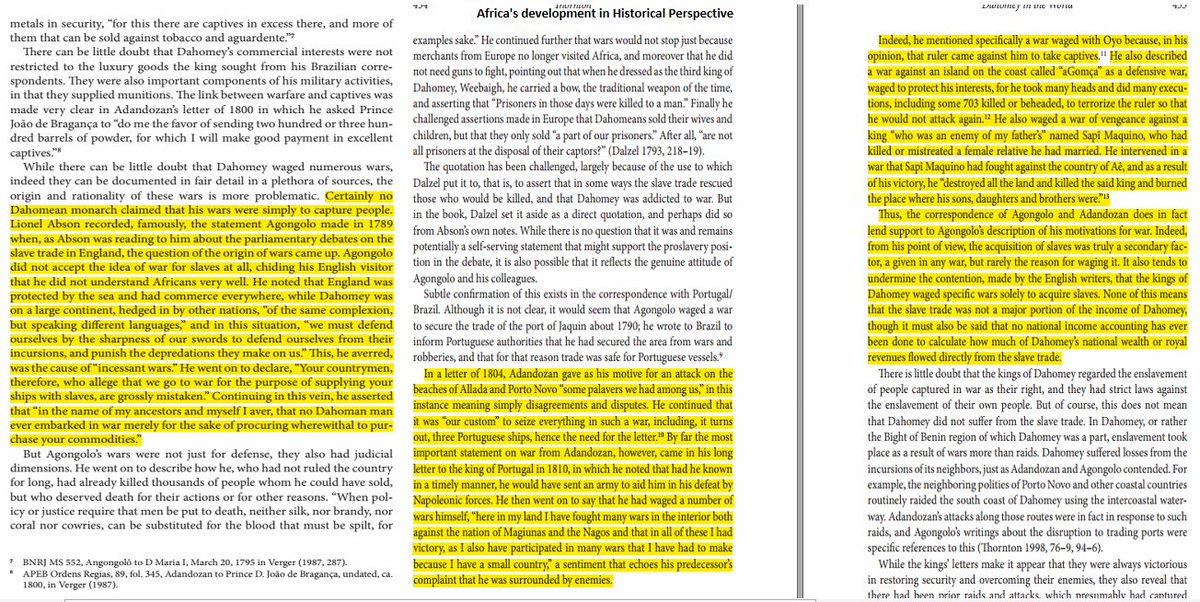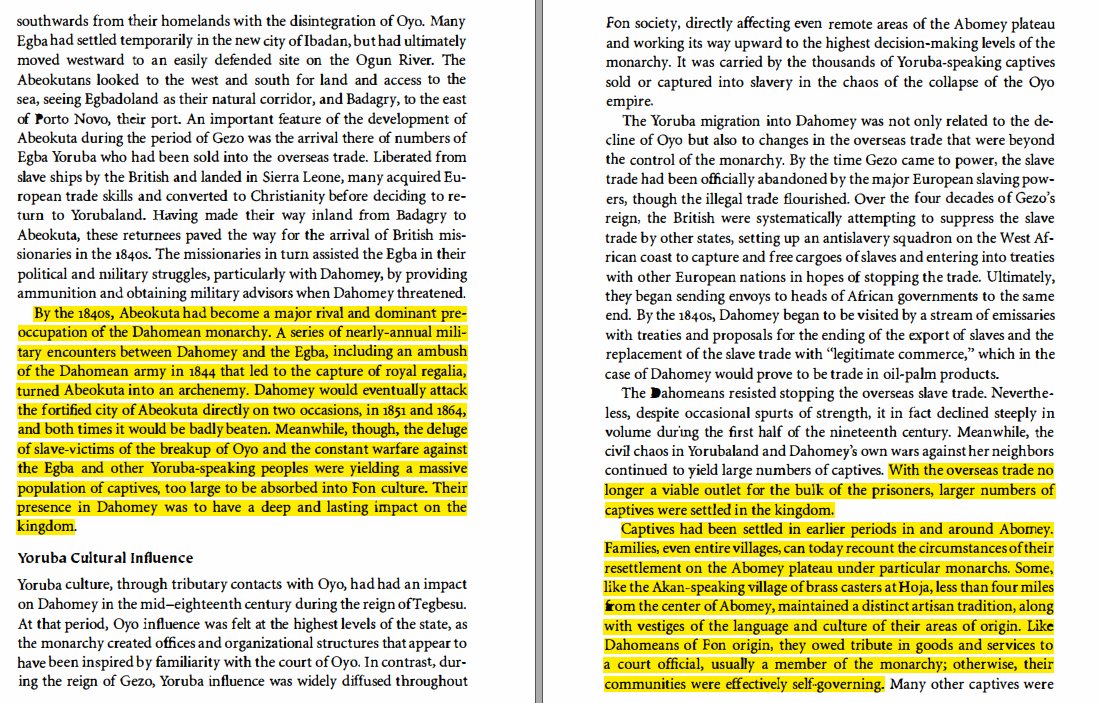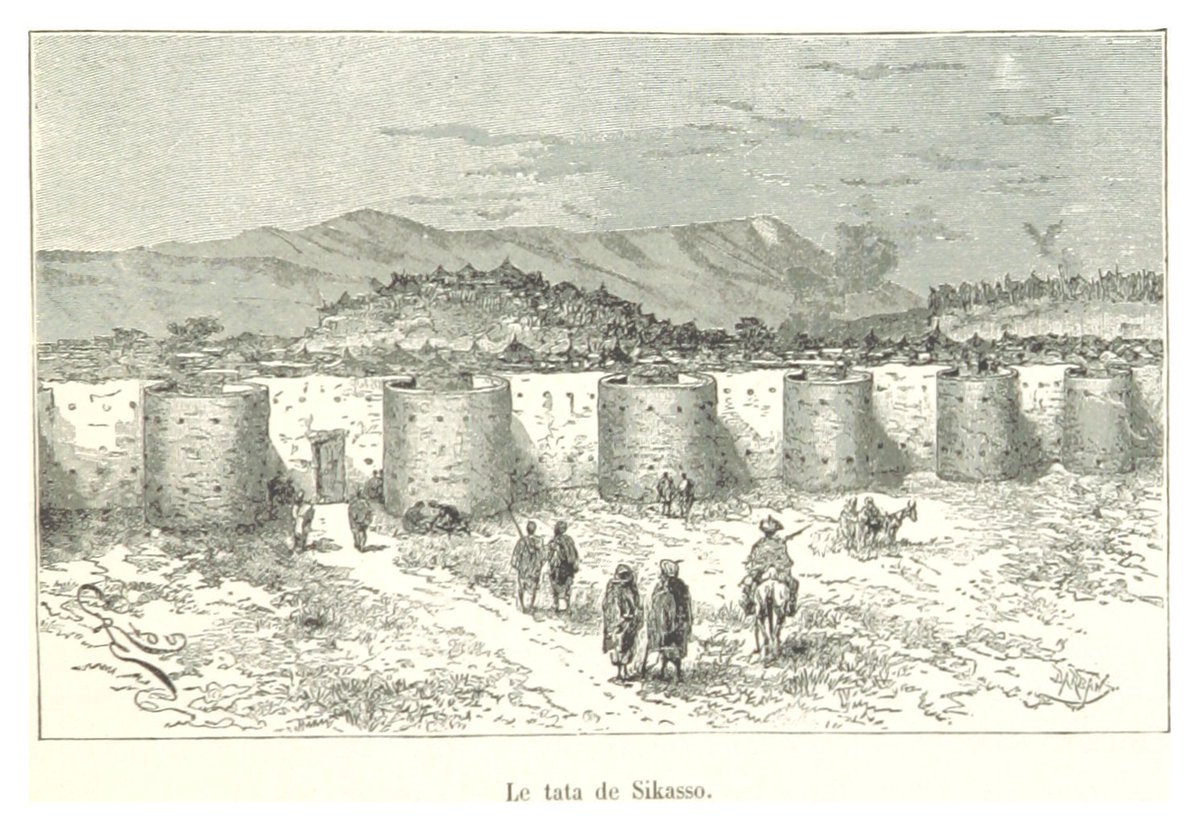
As a movie, #TheWomanKing was good, its light on dialogue but has well-choreographed action scenes; both the costumes and general cinematography are stunning (they took some liberties with the fort) and watching it was worth every second
The movie's runtime is mostly spent on the Agojie, but since most reviews were uninterested in that but instead focused on Dahomey's history
(or rather; what they think is Dahomey's history that they feel wasn't accurately portrayed)
I'll confine my commentary to that as well
(or rather; what they think is Dahomey's history that they feel wasn't accurately portrayed)
I'll confine my commentary to that as well
The debate revolves around Dahomey's political & economic objectives and how they were influenced by slave trade.
Many believe slave trade was a royal monopoly, whose armies (ie; Agojie) raided to sell to slave traders in a pattern that influenced Dahomey's objectives.
Many believe slave trade was a royal monopoly, whose armies (ie; Agojie) raided to sell to slave traders in a pattern that influenced Dahomey's objectives.
Determining the objectives of rulers, whether contemporary or historical is never easy.
Scholars attempt to read objectives circumstantially; eg a war to expand the state, a war in response to rebellion, a war intended to secure or open trade routes, a war to preempt another, etc
Scholars attempt to read objectives circumstantially; eg a war to expand the state, a war in response to rebellion, a war intended to secure or open trade routes, a war to preempt another, etc
In Dahomey's case many claim these wars were mostly offensive wars (raids) intended to capture slaves.
Their presumption is that since Dahomey's economy was dominated by revenues from slave trade, that the state's political and economic objectives were dictated by slave trade.
Their presumption is that since Dahomey's economy was dominated by revenues from slave trade, that the state's political and economic objectives were dictated by slave trade.
There's little evidence for this however
Studies on Dahomey's economy show that external slave trade was only a marginal component of the domestic economy;
the lowest and highest estimates place the share of external slave trade in Dahomey's economy at at between 2.5% and 15%
Studies on Dahomey's economy show that external slave trade was only a marginal component of the domestic economy;
the lowest and highest estimates place the share of external slave trade in Dahomey's economy at at between 2.5% and 15%

The above estimate of 2.5% is in line with other studies of pre-colonial west African economies, where slave trade's share in domestic African economies, was just 0.2%
and imports from slave trade weren't able to meet 2% of west African cloth demand, nor < 10% of its iron demand

and imports from slave trade weren't able to meet 2% of west African cloth demand, nor < 10% of its iron demand


Like most pre-modern states, Dahomey had a largely rural, agricultural economy, dominated by subsistence household production
with a significant domestic crafts industry that met the material demands of its population & produced surpluses that were given to the kings as tribute
with a significant domestic crafts industry that met the material demands of its population & produced surpluses that were given to the kings as tribute
2ndly
Dahomey's slave trade was never a royal monopoly, an 18th century sample shows that only 10% of slaves were sold by royals, while 50-80% were sold by private merchants (I will write something about these soon)
Dahomey's economy was therefore never dominated by slave trade
Dahomey's slave trade was never a royal monopoly, an 18th century sample shows that only 10% of slaves were sold by royals, while 50-80% were sold by private merchants (I will write something about these soon)
Dahomey's economy was therefore never dominated by slave trade

Since the Agojie were certainly never fighting to capture slaves, what were they fighting for?
In the movie, the empire of Oyo; to which Dahomey is tributary, is the primarily antagonist, its armies are dreaded by the Dahomey, and they routinely enslave some Dahomey after war
In the movie, the empire of Oyo; to which Dahomey is tributary, is the primarily antagonist, its armies are dreaded by the Dahomey, and they routinely enslave some Dahomey after war
Oyo was the dominant power in the region and Dahomey was tributary to it since 1726 upto 1823.
Oyo invaded Dahomey in 1728, 1729, 1730-32, 1742-1748, 1788
each time the Dahomey army fled their capital, and their land was thoroughly devastated, and prisoners carried off to Oyo
Oyo invaded Dahomey in 1728, 1729, 1730-32, 1742-1748, 1788
each time the Dahomey army fled their capital, and their land was thoroughly devastated, and prisoners carried off to Oyo

Oyo got involved with Dahomey after the latter had weaned itself of Allada's control and defeated it in 1724
Allada kings fled to Oyo and the latter attacked Dahomey in 1726
They worked out terms of tribute which then prompted Dahomey invasion of Heuda (and Ouidah port) in 1727
Allada kings fled to Oyo and the latter attacked Dahomey in 1726
They worked out terms of tribute which then prompted Dahomey invasion of Heuda (and Ouidah port) in 1727

Despite the truce with Oyo and defeat of Heuda, Dahomey was still the target of attacks from Both
-Hueda attimes allied with Oyo and had minor European support
Oyo's invasions only ended in 1780s, and Heuda's in 1774. Dahomey was thus sandwiched b'tn them and often on defensive



-Hueda attimes allied with Oyo and had minor European support
Oyo's invasions only ended in 1780s, and Heuda's in 1774. Dahomey was thus sandwiched b'tn them and often on defensive




The majority of Dahomey's wars were thus defensive and not offensive;
wars with Oyo often ended with renewed tribute, those with Heuda & allied European forts ended with their destruction
Dahomey's position in the "Benin" gap made it vulnerable to Oyo's cavalry and Ouidah's navy

wars with Oyo often ended with renewed tribute, those with Heuda & allied European forts ended with their destruction
Dahomey's position in the "Benin" gap made it vulnerable to Oyo's cavalry and Ouidah's navy


The image of Dahomey as a powerful, militant "African Sparta" was entirely invented by Europeans in their debates on abolitionism
It was far from the reality of Dahomey as a moderate power that fled every time it was attacked, and was only a vassal for 97 of its 200-yr existence
It was far from the reality of Dahomey as a moderate power that fled every time it was attacked, and was only a vassal for 97 of its 200-yr existence

Dahomey's kings thus perceived their kingdom as beleaguered and were pre-occupied with defending their territory & subjects from war and enslavement
as one king put it; “we must defend ourselves by the sharpness of our swords and punish the depredations they make on us.”
as one king put it; “we must defend ourselves by the sharpness of our swords and punish the depredations they make on us.”

The Agoji were therefore not fighting to enslave 'their people' to sell to the Europeans, but often found themselves fighting to defend their subjects from attacks (including Oyo's) that threatened them with enslavement. This scene was thus very accurate.
However, Dahomey's laws on who could be enslaved were unlikely to have been determined by a vague racial notion of "African-ess" as this scene suggests
They were determined by whether one was a subject of Dahomey
So Nanisca would have only cared about her subjects, not "Africans"
They were determined by whether one was a subject of Dahomey
So Nanisca would have only cared about her subjects, not "Africans"
one of its few historical inaccuracies
I understand why it was included given modern audience's perceptions of their identity in the world which transcend the Dahomey-centric view of the world that the Agojie had, where "other Africans" were as foreign to them as "non-Africans"
I understand why it was included given modern audience's perceptions of their identity in the world which transcend the Dahomey-centric view of the world that the Agojie had, where "other Africans" were as foreign to them as "non-Africans"
The inaccuracy is an anachronism
B'se the wars b'tn Oyo, Dahomey and Heuda took place in 1720s-80s, and Ouidah port would have been fully under Dahomey's control by the early 19th century when Gezo was in power, and while Oyo had a garrison at Cana, it didn't have one at Ouidah
B'se the wars b'tn Oyo, Dahomey and Heuda took place in 1720s-80s, and Ouidah port would have been fully under Dahomey's control by the early 19th century when Gezo was in power, and while Oyo had a garrison at Cana, it didn't have one at Ouidah
*side-note
Ouidah's slave exports fell by more than 70% after Dahomey's conquest, mostly because the private merchants who supplied it came from its suzerain; the Oyo empire, and the latter had diverted their merchant's business to Lagos, which became the largest slave port.


Ouidah's slave exports fell by more than 70% after Dahomey's conquest, mostly because the private merchants who supplied it came from its suzerain; the Oyo empire, and the latter had diverted their merchant's business to Lagos, which became the largest slave port.



Dahomey's Kings were fully aware of their humiliating vassalage to Oyo, and always tried to regain their independence by refusing to pay tribute
when Oyo descended into civil war after the Sokoto invasion of 1817, Dahomey seized the opportunity and defeated Oyo in 1823.
when Oyo descended into civil war after the Sokoto invasion of 1817, Dahomey seized the opportunity and defeated Oyo in 1823.

The victory over Oyo wasn't b'se Dahomey was now stronger, but rather that Oyo was weaker,
Traditions claim that most of Dahomey's successful attacks against Oyo were launched at night because Dahomey feared Oyo's unstoppable cavalry
an attack would look exactly like this scene
Traditions claim that most of Dahomey's successful attacks against Oyo were launched at night because Dahomey feared Oyo's unstoppable cavalry
an attack would look exactly like this scene
The flood of refugees from Oyo civil wars led to an influx of immigrants (free & slaves) in Dahomey jst when European countries had ceased slave trade.
Those slaves were thus not a product of Dahomey's strength but coincidence, many were integrated, some retained, few were sold
Those slaves were thus not a product of Dahomey's strength but coincidence, many were integrated, some retained, few were sold

Some of the integrated captives would have been from Mahi, a kingdom long at war with Dahomey over royal disputes btn 1740-1780s, and later a vassal of Oyo in the 1780s
Mahi was later partially defeated by Gezo in 1830s. Atleast two of Dahomey's queens were from the Mahi
Mahi was later partially defeated by Gezo in 1830s. Atleast two of Dahomey's queens were from the Mahi
Lastly, the "transition" from slave exports to Palm oil wasn't an existential question to Dahomey as its shown here.
As explained above, export trade remained marginal to the domestic economy.
conversely, it can be that this is jst one of many meetings so its not existential
As explained above, export trade remained marginal to the domestic economy.
conversely, it can be that this is jst one of many meetings so its not existential
In summary, those expressing their objections to what they consider #TheWomanKing 's "celebration of slavers" are misinformed by a very erroneous accounts of African history, that were entirely written by European polemicists who were ignorant of Dahomey's society and objectives
As I explain below;
Dahomey's history was at the center of the abolitionist debate in the west, as well as European philosophizing about the "nature of Africans" which they used to rationalize their own systems of chattel slavery and later colonialism.
isaacsamuel.substack.com/p/what-were-th…

Dahomey's history was at the center of the abolitionist debate in the west, as well as European philosophizing about the "nature of Africans" which they used to rationalize their own systems of chattel slavery and later colonialism.
isaacsamuel.substack.com/p/what-were-th…


#WomanKing was an excellent movie, while the polarized reviews punctuated by half-truths and pseudo-history have muddied the already false perception of Dahomey's history, its a good thing that they are now making big-budget movies about African History
icymi
The kingdom of Dahomey and the Atlantic world: a misunderstood legacy
On the mythical "Black Sparta" of Africa.
isaacsamuel.substack.com/p/the-kingdom-…
The kingdom of Dahomey and the Atlantic world: a misunderstood legacy
On the mythical "Black Sparta" of Africa.
isaacsamuel.substack.com/p/the-kingdom-…
For a more detailed overview of studies on the slave trade's effects, read;
What were the effects of the Atlantic slave trade on African societies?
The African view of the Atlantic world.
isaacsamuel.substack.com/p/what-were-th…
What were the effects of the Atlantic slave trade on African societies?
The African view of the Atlantic world.
isaacsamuel.substack.com/p/what-were-th…
• • •
Missing some Tweet in this thread? You can try to
force a refresh















